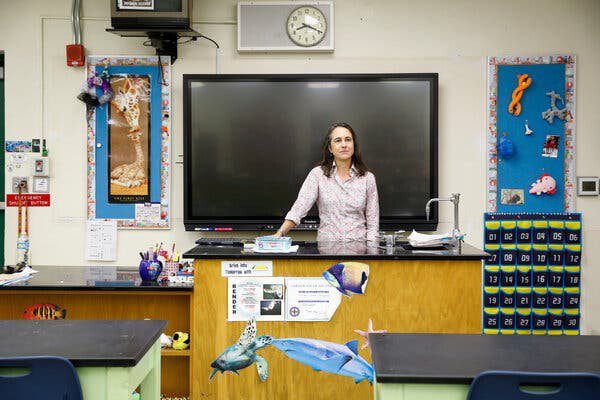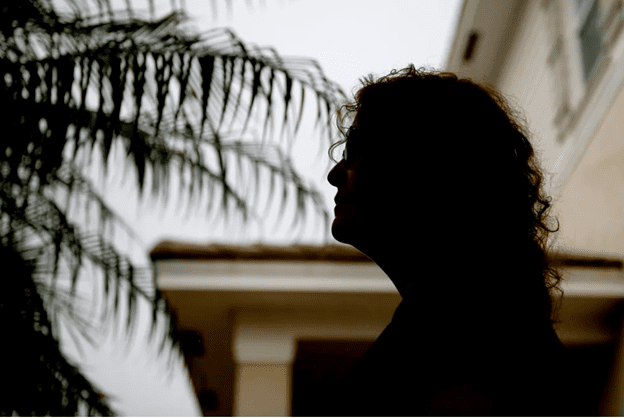She bullied and insulted students for years; her school let her keep teaching
The school district disregarded years of warnings about a Boca Raton Middle teacher from students, parents and its own administrators
The Palm Beach Post | by Andrew Marra | March 11, 2021
By the time school administrators moved last year to fire Susan Oyer, the Boca Raton Middle School teacher had spent nearly a decade drawing harassment complaints from children and parents.
There were accusations she quarreled with students. That she mocked their grades and intelligence. That she used their race or nationality to demean them. That she threatened to sue them. That she revealed confidential information about them to their classmates.
Students reported she pushed a girl from behind. That she prohibited students from using the bathroom. That she belittled a girl for not being an American citizen and threatened to report her to immigration authorities.
From 2012 to 2018, the social studies teacher was cited at least 10 times for her behavior in the classroom. She was the subject of three personnel investigations, each one upholding the allegations against her. She was fined by the state’s teacher-licensing board.
Her classroom conduct, her principal wrote in 2017, was “mean, rude and harsh.”
Yet through it all, Oyer kept teaching.
Despite years of troubling classroom conduct, Oyer avoided serious discipline or interventions for nearly a decade, taking advantage of leniency from her principal, union protections and gray areas in the school district’s disciplinary policies, a Palm Beach Post review found.
Oyer’s career in Palm Beach County’s public schools ended last year, after a fourth personnel investigation confirmed new allegations of verbally abusive behavior. District administrators moved to fire her, prompting her to resign in June.
School district officials declined to discuss their handling of Oyer’s case. But if their aim was to shield students from verbal harassment, it came years too late.
Year after year, the district disregarded a torrent of warning signs from parents, students and its own administrators and investigators, disciplinary records show.
Oyer, a 54-year-old Boynton Beach activist, city hall gadfly and descendant of one of the first families to settle Palm Beach County, began teaching in the school district in 1998. Her history of sanctions dates back to at least 2012.
Showing a child her mother’s jail mug shot
That year, records show, administrators issued Oyer three “memorandums of concern” and one set of “conference notes” – each one addressing a case where she made “inappropriate” comments to students.
The details of the memos and notes were not provided by the district, but state education records indicate Oyer was repeatedly cited at the time for inappropriate comments to students, including some of a racial nature.
In 2012, she made disparaging remarks about a student’s older brother who had a learning disability, an affidavit from the state’s teacher licensing commission states. She warned a student wearing tight pants not to dress like a “hoochie missy.”
When a student told her in 2013 that she and her father were traveling to Mexico to buy ingredients for his restaurant, records show Oyer asked her in front of the class, “Ingredients for what, a bomb?”
When some of her Black students failed to realize that the correct answer to a test question was “Soul Train,” the longtime music and dance TV program, Oyer said they were a disgrace to their race, the affidavit shows.
A student confided in her that her older sister, a minor, was pregnant, the affidavit states. Oyer revealed the secret to the rest of the class during a lesson about underage pregnancy.
Though they would later form the basis for state sanctions, the striking number of incidents and citations – five in less than a year – failed at the time to prompt more serious interventions.
Neither did her next opportunity for scrutiny, which came just a few months later.
In May 2013, three months after Oyer received her final set of conference notes, the school’s principal received a new complaint: Oyer had showed the student a photo of a woman’s jail mug shot.
Oyer asked the student whether the woman was the student’s mother. It was.
It’s not clear what prompted Oyer to ask about the photo, or whether other students overheard. Oyer and Boca Raton Middle’s longtime principal, Peter Slack, both declined repeated requests for comment.
For “not making a reasonable effort to protect a student from unnecessary embarrassment,” Oyer received a verbal reprimand.
“You failed to exercise professional concern that values the worth and dignity of a student,” Slack wrote.
The very next day, Oyer’s behavior came to Slack’s attention again. This time, for three new classroom incidents.
In the opening days of the school year, it turned out, Oyer had revealed confidential personal information about why a student was absent.
She had upset another student by insulting their penmanship.
And she told a student she refused to call her by her nickname. If the student wanted to be called by that name, she said, she would have to go to the courthouse and get her name legally changed.
‘I have decided not to issue a written reprimand’
The incidents had happened on the first day of classes in August 2013. Already, the parents of two students targeted by her comments had asked that their children be removed from the class. In a new reprimand, Slack scolded Oyer once again.
“Having three similar incidents the day after receiving a written directive constitutes insubordination on your part,” he warned.
But Slack told her something else in the memo. Despite the emerging pattern of troubling behavior, he said he was cutting her a break.
“The next sequential step would be the issuance of a written reprimand,” he wrote. “However, after careful consideration, I have decided not to issue a written reprimand.”
It was the seventh documented instance in less than two years of Oyer making inappropriate remarks to students. But, records show, Slack had decided the emerging pattern did not merit elevated concern.
Slack’s decision was a significant one. Under the school district’s contract with the teachers union, verbal reprimands – which, despite their name, are documented in writing and sent to the state’s teacher-licensing board for review – cannot be placed in a teacher’s personnel file.
And unlike written reprimands, verbal reprimands cannot be used for disciplinary purposes more than a year after the fact, meaning they cannot be factors when considering elevated discipline in subsequent years.
Two years later, Oyer was disciplined again. This time the complainant was not a parent but The Hershey Company, the Pennsylvania-based chocolate manufacturing giant.
Oyer, it turned out, had enlisted her students to write angry letters to the company, offering them extra credit to do so. Forty-eight students had taken up the offer.
The motivation for the letters is unclear. But when Hershey’s director of corporate communications alerted Slack, the principal was not amused.
In a letter to Oyer, Slack said her decision to “indoctrinate” her students against the company – and use the promise of extra credit to entice them to write letters – was “ethically perverse.”
Again, Slack gave her a verbal reprimand.
By then, Oyer had been cited seven times in three years for inappropriate classroom behavior.
In June 2016, the state stepped in.
Florida’s teacher-licensing commission sanctioned Oyer, citing her long list of inappropriate classroom remarks from 2012 through 2015.
She received a letter of reprimand from the state Education Practices Commission, was required to pay a $750 fine, had to take an education ethics course and had her license placed on probation for three years.
Expletives, warnings about Russians
Still, her actions had yet to rise to the level of a district personnel investigation. A few months later, that changed.
In September 2016, just three months after the state sanctions, Slack asked the district to investigate new allegations that Oyer was mistreating students. In the span of a few months, at least three more parents had asked to have their children removed from her class.
The district investigator interviewed more than 30 students, parents and administrators and uncovered a deluge of troubling anecdotes.
The students told the investigator that Oyer would yell at them, often using expletives like “asshole” and “bullshit.” She boasted about getting other students in trouble.
She would embarrass students by announcing their parents had emailed her with concerns. She would complain that her brothers were professionally successful – one brother, Harvey Oyer III, is a prominent West Palm Beach attorney – while she was stuck teaching them.
She would make strange claims about Russians, saying they can’t be trusted and should be avoided. A parent said she told her child that no matter how much the students hated her, they could never get rid of her because she had tenure.
One father emailed an assistant principal to say that his daughter used to love school. Since being enrolled in Oyer’s class, he said, she had undergone “a big change.”
“The other day she cried in my arms and said Daddy I just can’t take it she is so mean to me and everybody in the class,” the father wrote.
The assistant principal revealed that Oyer had once admitted to telling her students she took pleasure in getting students in trouble.
“She admitted saying (to students) she would smile if a child got a referral,” Assistant Principal Jude Hodgens wrote.
Three students said they witnessed Oyer shove a female student from behind to move her away from her desk. When the student rubbed her back afterward, Oyer yelled that she didn’t have cooties.
The girl’s parent wrote to the school demanding her child be transferred, saying that her daughter “has been very tolerant yet distraught at times by her exposure to this non-teaching environment full of obscure and intimidating personal opinions expressed by Ms. Oyer.”
“However,” she added, “recently this became a threatening and physical manner towards my daughter.”
Another parent told administers that they “need my son out of Miss Oyers room immediately.”
“She is abrasive and intimidates him,” the parent stated. “He cannot learn in that classroom environment.”
‘Offensive or humiliating education environment’
In her report, the district investigator concluded Oyer “bullied and/or harassed” students with “repeated verbal behavior that was severe and/or pervasive enough to create an offensive or humiliating education environment in her classroom.”
But she said she was leaving it to the principal to decide what disciplinary action to take.
In a letter to Oyer, Slack concluded that she had been “mean, rude and harsh to students.”
He concluded Oyer had “touched a student’s back with force.”
In addition, he continued, she had “embarrassed, intimidated, harassed, humiliated, picked on, yelled at, screamed at, and cursed at” students.
The consequence? Once again, Slack decided not to escalate the level of discipline.
He gave her another verbal reprimand, her fourth in three years.
She remained in the classroom.
In a statement, the school district declined to comment on the particulars of Oyer’s case, saying an agreement it signed with her prohibited the district from speaking critically of her.
But the district directed some of the responsibility to its contract with the teachers union, which requires the district to use a policy of “progressive discipline” in meting out consequences for most misconduct.
“The School District investigates allegations made against any employee,” it said. “It’s important to note that the District adheres to progressive discipline in accordance with the Palm Beach County Classroom Teachers Association’s Collective Bargaining Agreement.”
The president of the teachers union scoffed at that assertion, saying the district has leeway to skip steps in the progressive-discipline process when warranted.
“Blaming due process rights that legitimately protect employees from arbitrary and capricious disciplinary acts by their employer is a cop-out,” Katz said. “The district employees who oversee disciplinary processes are highly trained individuals. If they want to terminate someone for cause, nothing can stop them from making such a recommendation to the school board.”
Indeed, the union contract permits the district to waive progressive discipline requirements when “the actions/inactions of the employee clearly constitute flagrant or purposeful violations of reasonable school rules and regulations.”
‘Ms. Not-Even-An-American talking’
Barely six months later, in February 2018, came the next report of trouble. It was a message from a concerned resident, written on behalf of a school parent who spoke little English.
It concerned something Oyer had said to the woman’s daughter.
Oyer, the parent said, had mocked her daughter for not being American – saying in front of the class, “Oh look, Ms. Not-Even-An-American talking.”
What’s more, the mother said, Oyer had threated to call federal immigration authorities on the student.
A district investigator interviewed Oyer and seven students from the class, including the student who was the subject of her comments.
The student told the investigator that Oyer made the remark during a discussion in the days following the Parkland school shooting massacre, as the student was speaking out about the need for youths to protest against gun violence.
“I kept talking and she said, ‘Oh look, Miss Not Even An American talking,’” the student recalled. “The whole class laughed about 10-15 seconds, embarrassing me. I was sad and mad.”
The student said Oyer went further afterward.
“She later looked at me and said she was going to tell immigration,” she said. “I don’t know if she meant it as a joke, but it was a pretty mean thing to say.”
The student said the interaction changed how she behaved in class.
“I don’t speak out anymore in class,” she said. “I don’t want my mom to lose her job.”
Oyer told the investigator she did not recall making the “Ms. Not-Even-An-American” comment. And she denied threatening to call immigration.
But all six other students interviewed by the investigator recalled the “Not-Even-An-American” comment. Three of them recalled her making a remark about alerting immigration officials.
Once again, the investigation concluded, Oyer had violated district policies by insulting her students, in this case with ones that targeted a student’s nationality. She had defied repeated past directives to refrain from demeaning students, constituting insubordination.
For this, her principal issued a written reprimand, her first one. She refused to sign it.
She remained in the classroom.
Hesitation to jump steps in progressive discipline
While the school district often will quickly remove a teacher from the classroom after an allegation of sexual or physical abuse, administrators hesitate to do so for less-serious offenses, the district’s director of employee relations said.
Under the district’s progressive discipline guidelines, employees generally receive a modest consequence for a first offense, such as a verbal reprimand, and then more serious consequences if the offense is repeated.
The next step typically is a written reprimand, then a suspension, and then termination.
“We can jump steps in cases where it’s a real and immediate danger to the district, or if their actions or inactions clearly constitute a flagrant violation,” said the director, Vicki Evans-Pare. “We can go straight to termination with those cases.”
But, she said, taking more drastic actions often runs legal risks.
Employees have a right to appeal disciplinary decisions, and administrative law judges often will throw out the disciplinary action if the district hasn’t started with more gradual steps.
For that reason, Evans-Pare explained, the district tends to try to work with an employee to improve their behavior before punishing, removing or seeking to fire them.
“That is one of the things that the district prides itself on, coaching teachers to help make them better,” she said. “We want teachers to be better teachers.”
In Oyer’s disciplinary records, though, there is no mention of efforts to coach or improve her behavior beyond her principal’s reprimands. The only “relevant trainings” mentioned by that point: an ethics course she took in 2010.
Mocking students’ grades in front of them
It was less than a year and a half before personnel investigators were summoned again to Boca Raton Middle over more complaints about Oyer.
In September and October 2019, three more parents had contacted the school to raise concerns.
By now, the pattern was familiar. An investigator interviewed 22 students. She heard multiple reports that Oyer repeatedly mocked students’ grades in front of the class.
Several students said Oyer warned one student she would send him to a “special school” if he didn’t behave.
She told students they didn’t deserve to be in her class, the students said. She refused to let certain students use the bathroom.
She told children droopy pants were something men in prison used to attract attention from fellow prisoners.
A parent who met Oyer at the school’s annual open house reported that she said — in front of another parent — that her son was slowing down the class and would never make it through high school.
But, the parent recalled. Oyer added that the district would not let him repeat the grade because he was Black.
Once again, the investigation concluded Oyer had made “inappropriate comments” to both students and parents, in violation of school district policies.
Once again, the investigation concluded that she had failed to comply with “directives given to her in extensive previous documentation,” and that her actions constituted “gross insubordination.”
The investigation did not recommend any discipline or intervention. It’s not clear what, if any action, was taken, though records show around the same time she completed another ethics training course.
Oyer remained in the classroom.
‘Clear and convincing evidence’ of misconduct
The beginning of the end came in January 2020, just two months before schools would close for the coronavirus pandemic.
Another parent had emailed the school warning Oyer was bullying their child, pushing a political agenda in class and conducting herself in “crazy and unprofessional” ways.
Slack asked the district’s personnel office to investigate once more.
The new round of interviews turned up a new set of alleged insults and strange comments.
Multiple students said Oyer had threatened to sue students if they bumped into her in the hallway, that she regularly criticized President Donald Trump in class, and that she singled out certain students for repeated criticism in front of their classmates.
Oyer, in an interview with the investigator, denied targeting certain students for mistreatment. She admitted to warning students of consequences if they accidentally knocked her over but denied saying she would sue them. She said the class often discussed politics, but she never disparaged the president.
Some of the students complaining about her had persistent behavior problems, she said.
She believed, she said, the students were working together to get her fired.
The allegations were, in some respects, mild in comparison to things she was found to have said in previous years.
But this time there would be no verbal reprimands.
The investigator concluded there was “clear and convincing evidence” of misconduct and submitted the incident to district administrators.
Weeks later, on Feb. 25, Superintendent Donald Fennoy moved to fire her. A school board vote on her termination was set for March, then postponed. She agreed to resign in June.
In December, the state’s teacher-licensing board took up her case again.
The state’s education commissioner had moved to sanction her two years earlier, in December 2018, after the “Oh look, Ms. Not-Even-An-American talking” remark.
But the case, it seemed, had stalled in the state bureaucracy. By the time the licensing board took it up, the commission had another set of misconduct allegations to consider.
The agency informed Oyer it had agreed to a settlement that bars her from teaching in Florida’s public schools – but only for a while.
Her teaching certificate would be suspended for six months, the settlement said. She would have to pay a $1,000 fine and take a classroom management course.
Her license would remain on probation for three years.
But by the time summer rolled around in June, she would be clear, once again, to return to the classroom.
Photo: Former Boca Raton Middle School teacher Susan Oyer at the Boynton Beach Senior Center in 2019. Bruce R. Bennett, Palm Beach Post






